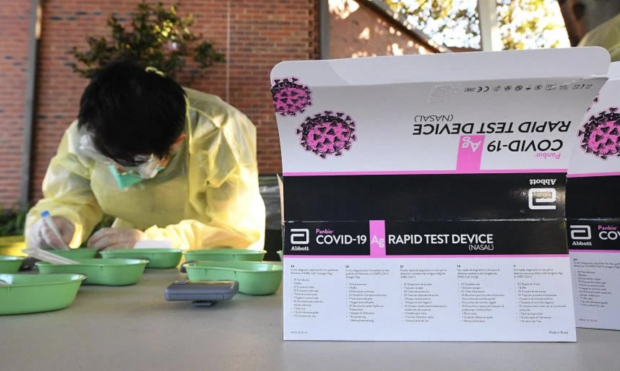
Healthcare workers preparing to administer Covid-19 antigen rapid tests to students at Firbank Grammar School in Melbourne. The Straits Times/Asia News Network
SYDNEY – At the height of the Covid-19 pandemic, Australian states and territories bought 518 million antigen rapid test (ART) kits – or about 20 for each of the country’s 26 million residents.
Many of these tests have been distributed for use, but there are still tens or even hundreds of millions of tests that are unused and set to expire, prompting debate in Australia about what to do with them.
The state of Victoria, for instance, ordered about 200 million ART kits – or about 30 for each of its 6.6 million residents. But it still has about 40.5 per cent of these – or around 80 million – in storage, according to analysis by ABC News.
Queensland ordered seven kits for each of its 5.3 million residents but still has 65 per cent in storage.
About 9 per cent of Queensland’s supply – or 3.47 million kits – have reportedly been thrown out or will expire in the coming three months. Queensland’s government is now considering the possibility of recycling the kits or donating them.
Australia has already sent more than 450,000 kits to Pacific nations such as Samoa and Tonga, as well as some kits to countries like Indonesia. But analysts say many developing countries are not doing testing and may not need large supplies of ART kits.
In some cases, the authorities in Australia have extended the original shelf life of the kits. Some tests can now be used for up to 18 months after purchase, compared with original expiration periods of four to six months.
In states where ART kits are not free, they typically cost about A$10 (S$9.10) to A$15 each.
Most experts say the best solution is to simply give away the kits or to recycle them. Some states have embarked on large-scale giveaways at shopping centers or at pharmacies and medical centers, but others have restricted free handouts to health workers or those deemed vulnerable, like aged-care residents.
An expert on waste transformation, Professor Ali Abbas, told The Straits Times that excess unused ART kits can be treated as normal waste and recycled. In contrast, used kits cannot be recycled and are mostly incinerated due to the risk of contamination.
“(An ART kit) is composed of several materials – including plastics, cardboard and paper – which may be separated, and each material recycled via different ways,” said the chemical engineer at Sydney University.
“It is important that the manufacturer takes responsibility to demonstrate the recyclability of their product, and in this way we link the design step of the product to its end-of-life step.”
Australia’s massive stockpile of kits is largely due to its handling of the pandemic. During the first two years of the pandemic, the country imposed some of the world’s strictest lockdowns and border closures. But restrictions began easing in late 2021 and borders fully reopened. This led to much of the country experiencing large outbreaks – often for the first time – and prompted a rush to stockpile testing kits.
There were large-scale shortages of ART kits when Australia experienced its first serious Covid-19 outbreak in late 2021. State governments were widely blamed at the time for failing to buy enough kits, which may have then prompted them to buy too many.
As of Jan 1, 2023, the federal government ended the availability of free walk-in polymerase chain reaction (PCR) testing, which can now be accessed without charge only if people have a referral from a doctor or nurse.
Australia is still experiencing substantial Covid-19 case numbers after a recent serious outbreak that peaked in mid-December.
There are currently fewer than 2,000 Covid-19 patients in Australian hospitals, down from a peak of 3,593 on Jan 4. But fatalities are high, with 370 Covid-19-related deaths in the past week, down from a peak of 413 two weeks ago.
The current ART kit stockpile has led to calls to explore how to avoid the problem in any future pandemics, including ensuring that Australia’s various state and federal health and financial authorities improve their coordination of mass purchases.
An opposition MP in Western Australia, Mr Martin Aldridge, has criticized the state’s decision to buy an A$600 million stockpile of ART kits, which it is unlikely to fully use. He has accused the government of “hoarding” and has urged it to consider how to deploy its remaining supplies.
“We do not know how individual tests will respond to future variants of concern,” he told The West Australian newspaper in August 2022.
“We will see in time whether they remain effective or whether we end up dumping them into landfill.”
RELATED STORIES
Australia to ring in 2023 with no COVID-19 restrictions
Factbox: Canada, Australia, Morocco add to COVID-19 restrictions on Chinese travelers